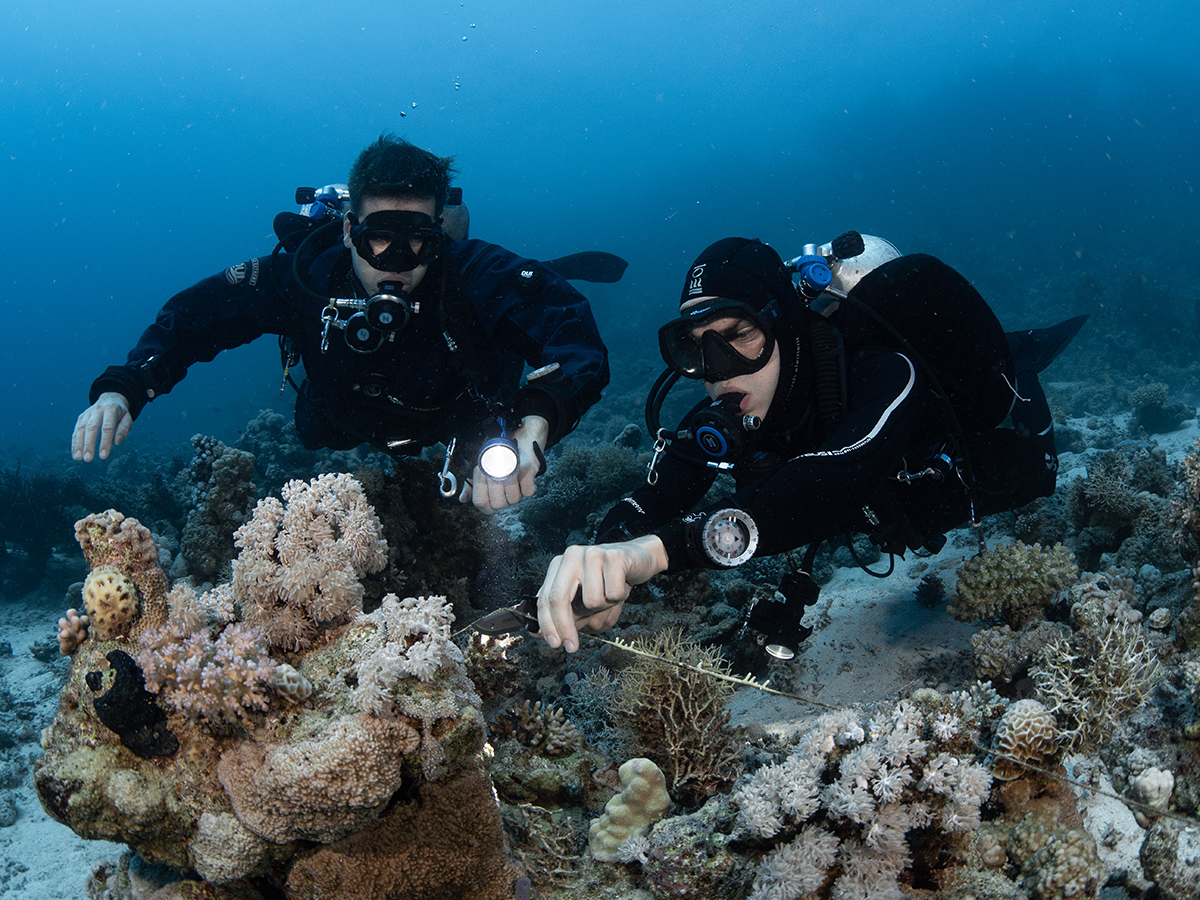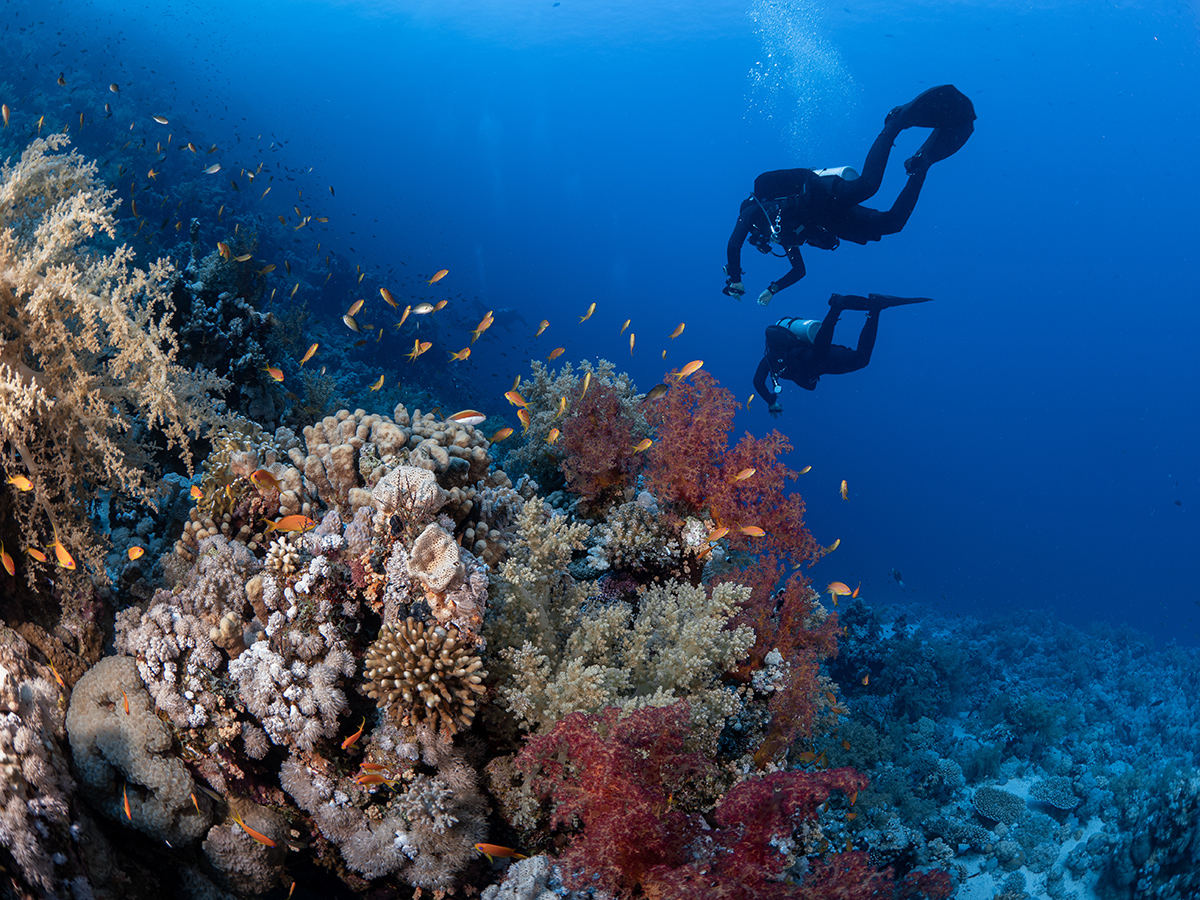GUE Conservation Pledge
HOW GUE IS ADDRESSING THE GLOBAL CRISIS
GUE recognizes the degradation of our world as a crisis of epic proportions requiring immediate action, both at our organizational level, as well as from each individual. As divers, we have a unique perspective, and with that comes the responsibility to use our skills and voices to protect the places we love to dive. To that end, we have outlined the specific actions we are currently taking as well as those we pledge to take tomorrow and in the future to save the planet, especially our underwater ecosystems. We hope we can count on you to do your part.


Global Underwater Explorers has pledged to:
- Review all current and planned clothing items and, where possible, switch to materials such as bamboo, hemp, 100% cotton, or recycled fibers in 2022.
- Review all of our non-clothing merchandise and, where possible, switch to recycled or natural materials.
- Offer students the ability to opt out of printed certifications in 2022.
- Switch product packaging to recycled, compostable, and/or reusable materials and remove any unnecessary materials in 2022.
- Minimize printed documents and utilize sustainable paper options for all print items starting in 2022.
- Include a statement regarding GUE’s conservation stance in all of our course materials with suggestions as to how GUE divers can do their part to support our conservation goals.
- Plan the 2022 GUE Conference with conservation and sustainability in mind, including reducing reliance on single-use plastics.
- Actively participate in ongoing research of aquatic environments around the world.
- Encourage our communities to get involved in their local environmental protection (turn every dive into a win for the planet).
- Use our voice as divers to protect the places we love (community outreach).
What we're doing now
- Donating to SeaGrass Grow to offset the carbon footprint of HQ operations and GUE.com order shipments.
- Encouraging our members, students, and divers to donate to SeaGrass Grow to offset their carbon footprint from dive travel.
- Using sustainable shipping materials, including recycled and multi-use mailers, cardboard, paper fill, recycled and kraft tape, and recycled labels with curbside-recyclable backing. When used, plastic air pockets or bubble wrap are reused and recycled from other sources, but never purchased.
- Using recycled paper for office printing and purchasing eco-friendly office supplies when replenishing or replacing worn out items.
- As of July 2021, printing all physical certification cards on bioPVC (biodegradable PVC) stock that is 99% PVC and fully biodegrades within nine months to five years of continual exposure to microorganisms in a fertile environment (e.g., soil, compost, trash dump, water, etc.).
- Providing divers with digital versions of active (non-expired) certifications, reducing the need for replacements of misplaced certification cards.
- Utilizing an e-signature platform for student profile forms, eliminating the need for printed and signed forms when students start a class.
We know that many human activities—including diving—cause damage to the environment. So, how do we minimize our effect on the places we love to dive?
First, do less harm.
How can we do less harm to the environment? How can we reduce our effect on a larger scale and a smaller one? Let’s focus on a few key areas.
Plastics
“Marine debris is globally recognized as a monumental environmental concern. It is a danger to all marine life including birds, sharks, turtles, and marine mammals, causing injury or death through drowning, entanglement, or starvation following ingestion. Plastics make up a large part of the marine debris that is choking our oceans. Marine debris is any persistent, manufactured or processed solid material discarded, disposed of or abandoned in the marine and coastal environment. This includes consumer items such as glass or plastic bottles, cans, bags, balloons, rubber, metal, fiberglass, and cigarettes. It also includes fishing gear such as line, ropes, hooks, buoys and other materials lost or intentionally discarded at sea.”
--Sea Shepherd
Plastics on beaches and underwater have become a global problem. No part of the aquatic ecosystem has been left untouched, even the deepest parts of the ocean. At current rates, plastic is expected to outweigh all the fish in the sea by 2050 (World Economic Forum). So what can you do?
- If you see trash, pick it up and dispose of it correctly.
- Before buying something, stop and think, “Do I really need this?”
- Carry a reusable bag when shopping. Keep a few in your car or by the door to help you remember!
- Decline single-use cutlery and drinkware in restaurant takeaways. Get a reusable cup and travel utensils for your on-the-go coffee and meals.
- Donate clothes and other items instead of throwing them away, and consider purchasing second-hand when practical.
- Make it easy to avoid buying water in plastic bottles when you’re out by always carrying a reusable water bottle.
- Avoid bottled water at home by investing in a water carbonator if you are a fan of sparkling water, and by using a filter for your tap water, or by utilizing water bottle refill kiosks.
- Purchase products that have compostable packaging or no packaging.
- Choose products that do not contain microbeads (toothpastes, face scrubs, etc.).
- Reuse plastic packaging as many times as you can. If it’s supported in your community, recycle rather than throw away.
- Avoid products with excessive packaging. Some produce does not need to be wrapped in plastic, and reusable mesh produce bags are a great alternative for loose items that need to be contained.
- Encourage the places you do business with to stop using single use plastic or to discourage their use by charging customers for them.
- Educate those around you and don’t be afraid to talk about trash with your friends, family, and community. If people are unaware of a problem, they don’t know that they need to fix it.
Dive Locally vs. Flying to Dive
Staying close to home for your diving is good for the planet, and there are often plenty of places to explore in your area. Try cold-water diving in the winter instead of traveling to warmer places, or dive in a lake in a neighboring town if you do not live near the ocean.“There is no doubt that flying is a major contributor to the climate crisis. It’s also one of the few major sources of CO2 emissions that continue to grow in the European Union – up 26% in 2018 from 2013. Before Covid hit, the number of passengers in Europe was also growing – up more than 30 percent over the last five years.”
--Greenpeace
We understand the desire to explore; after all, that is part of what makes us GUE divers. So when choosing to travel for diving, offset your carbon emissions when flying by purchasing this add-on from your airline or donating to an organization that plants trees or seagrass, such as SeaGrass Grow. Consider traveling to places where your diving is also contributing to conservation. For example: coral planting, participating in scientific research with local entities, or organizing cleanups.
Eat Sustainably
“Around the globe, food production, distribution, management and waste threaten wildlife, wild places and the planet itself.
Today, 7.3 billion people consume 1.6 times what the earth’s natural resources can supply. By 2050, the world’s population will reach 9 billion and the demand for food will double.
So how do we produce more food for more people without expanding the land and water already in use? We can’t double the amount of food. Fortunately we don’t have to—we have to double the amount of food available instead. In short, we must freeze the footprint of food.
In the near-term, food production is sufficient to provide for all, but it doesn’t reach everyone who needs it. About 1.3 billion tons of food are wasted each year—four times the amount needed to feed the more than 800+ million people who are malnourished.”
--World Wildlife Fund
This is all about doing your part, and it’s something every one of us can easily do by taking simple steps. Knowing where your food actually came from is difficult in the 21st century, but when you can, buy local produce and reduce your meat and fish consumption. Eliminate as much food waste as possible--don’t overorder or overeat, and don’t neglect leftovers. This will reduce your carbon footprint and help your health and budget.
Get Involved
GUE members support conservation through a variety of affiliates and volunteering for different conservation focused entities.
Organizations to get involved in:

